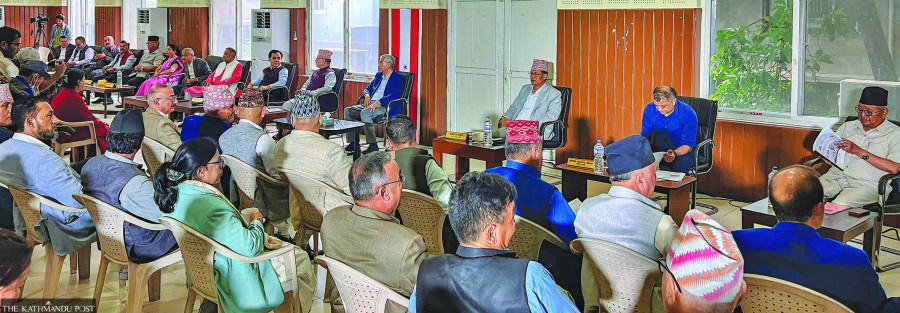Politics
Nepali Congress central meet fails to discuss leadership of its sister wings
Ignoring internal organisations will only weaken the party, leaders say.
Nishan Khatiwada
With the Nepali Congress leadership enmeshed in a power struggle, almost all of the party’s sister wings and central departments are either incomplete or in disarray.
Organisations such as the Nepal Student Union, Nepal Women Association and Nepal Dalit Association are incomplete—some of them are running with only the chairpersons—while the Nepal Tarun Dal is disorganised and has way too many members.
More than a year and half following the Congress general convention, only one of the 48 central departments the statute envisages has been formed.
Some party leaders accuse the top leadership of turning its back on the party’s internal organisations despite repeated calls for a course correction.
Key leaders have been focusing merely on acquiring power and positions and are cornering each other, said Bhupendra Jung Shahi, a youth leader. “Ignoring the internal organisations will only weaken the party,” he said. “It means ignoring the public's concerns.”
Wings of the Nepali Congress include Nepal Women Association, Nepal Tarun Dal, Nepal Student Union, Nepal Prajatantra Senani Sangh, Nepal Peasants Association, Nepal Dalit Association, Nepal Bhutpurva Sainik Sangh, Nepal Aadivasi Janajati Sangh, Rastriya Loktantrik Apanga Sangh, Nepal Muslim Association, Nepal National Magar Association and Nepal Thakur Samaj.
Nepali Congress’s central committee meeting that concluded on Wednesday after nine days of discussion remained largely a tug of war between the establishment and rival factions. Party leaders spent most of the time criticising each other. The status of the internal organisations didn’t figure in the discussions.
As per the party’s statute, its central departments should be completed within six months of the general convention. Every department can have a maximum of 51 members. But both the provincial and central departments have been without members and are thus ineffective.
Some leaders claim the party will soon fill the vacancies in the internal organisations.
Publicity department chief Meen Bishwakarma said the party leaders have reached a common understanding to complete all the sister organisations and the central departments by September 1. The deal, however, has not been formally declared yet. “We should have done so before the general elections,” Bishwakarma told the Post. “But we will complete the internal organisations by September 1.”
Observers say that it is a high time the party built and strengthened its organisations. Purushottam Dahal, a journalist who has been following Nepali Congress politics for decades, said as the general convention of the organisations may not be viable in such a short time, they must proceed by forming ad hoc committees.
Besides the sister wings and central departments, the Congress has a central policy, research and training school headed by the party vice-president. Other committees include the Central Disciplinary Committee and Central Account Committee.
Some youth leaders have been pressing for party reform and even for a change in its leadership of late, arguing that the Congress has been failing to build and strengthen its organisations despite mounting challenges from newly emerged political forces as evident from the recent general elections and bypolls.
Some youth leaders recently launched the ‘Nepali Congress Transformation Campaign’ aiming to ‘revive’ the party and strengthen its grassroots. As part of the campaign, they organised major gatherings in all seven provinces. They have also submitted their suggestions to the party leadership.
So why has the grand old party been failing to build and strengthen its internal organisations despite repeated calls?
Journalist Dahal said that the Nepali Congress leadership has been hesitating to do so. Factionalism that runs rampant in the party has led to each faction demanding its shares in every organisation and that has further complicated the matter, Dahal said.
But the leadership’s indifference to the sister organisations is anything but new. “The same happened during Girija Prasad and Sushil Koiralas’ tenures,” Dahal said. “Before that, the political situation of the country was not favourable for many wings and departments.”
Dahal also offers a suggestion. “Party organisations should be constituted not just to fulfil the positions and address factional interests, “ he said. “They should be small, effective and active.”




 13.12°C Kathmandu
13.12°C Kathmandu














